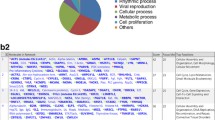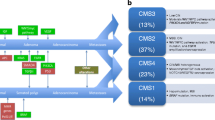Abstract
Understanding of the metabolism and mechanisms of resistance of tumors to chemotherapeutic agents is essential so that we can administer therapy to maximize response and minimize toxicity. In this review we describe molecular markers associated with fluoropyrimidine and platinumbased chemotherapy that may predict the outcome of therapy when patients are treated with these agents. We discuss the ways in which determination of gene expression levels can enhance the treatment of colorectal cancer through prediction of patient response and tailoring of chemotherapy to the characteristics of an individual tumor.
Similar content being viewed by others
References and Recommended Reading
Cancer Facts and Figures. Atlanta, GA: ACS Surveillance Research; 2003.
SEER Cancer Statistics Review: 1997–2000. Bethesda, MD: National Institutes of Health; 1993.
Saltz LB, Cox JV, Blanke C, et al.: Irinotecan plus fluorouracil and leucovorin for metastatic colorectal cancer. N Engl J Med 2000, 343:905–914.
Wolmark N, Rockette H, Fisher B, et al.: The benefit of leucovorin-modulated fluorouracil as postoperative adjuvant therapy for primary colon cancer: results from National Surgical Adjuvant Breast and Bowel Project protocol C-03. J Clin Oncol 1993, 11:1879–1887.
Watanabe T, Wu TT, Catalano PJ, et al.: Molecular predictors of survival after adjuvant chemotherapy for colon cancer. N Engl J Med 2001, 344:1196–1206.
Miyamoto S, Ochiai A, Boku N, et al.: Discrepancies between the gene expression, protein expression, and enzymatic activity of thymidylate synthase and dihydropyrimidine dehydrogenase in human gastrointestinal cancers and adjacent normal mucosa. Int J Oncol 2001, 18:705–713.
Berger SH, Jeng C-H, Johnson LF, et al.: Thymidylate synthase overproduction and gene amplification in fluorodeoxyuridine-resistant human cells. Mol Pharmacol 1985, 28:461–467.
Peters GJ, van der Wilt CL, van Groeningen CJ, et al.: Thymidylate synthase inhibition after administration of fluorouracil with or without leucovorin in colon cancer patients: implications for treatment with fluorouracil. J Clin Oncol 1994, 12:2035–2042.
Johnston PG, Fisher ER, Rockette HE, et al.: The role of thymidylate synthase expression in prognosis and outcome of adjuvant chemotherapy in patients with rectal cancer. J Clin Oncol 1994, 12:2640–2647. TS is found to be a prognostic marker in patients with rectal cancer.
Lenz HJ, Danenberg KD, Leichman CG, et al.: p53 and thymidylate synthase expression in untreated stage II colon cancer: associations with recurrence, survival, and site. Clin Cancer Res 1998, 4:1227–1234.
Aschele C, Domizia D, Stefania C, et al.: Immunohistochemical quantitation of thymidylate synthase expression in colorectal cancer metastases predicts for clinical outcome to fluorouracil-based chemotherapy. J Clin Oncol 1999, 17:1760–1770.
Johnston PG, Lenz H-J, Leichman CG, et al.: Thymidylate synthase protein and gene expression predicts for response to 5-fluorouracil, leucovorin in patients with colorectal and gastric cancer. Cancer Res 1995, 55:1407–1412.
Leichman CG, Lenz HJ, Leichman L, et al.: Quantitation of intratumoral thymidylate synthase expression predicts for disseminated colorectal cancer response and resistance to protracted-infusion fluorouracil and weekly leucovorin. J Clin Oncol 1997, 15:3223–3229. TS is found to be a predictive marker in patients with metastatic colorectal cancer receiving 5-FU-based chemotherapy.
Metzger R, Danenberg K, Leichman CG, et al.: High basal level gene expression of thymidine phosphorylase (platelet derived endothelial cell growth factor) in colorectal tumors is associated with nonresponse to 5-fluorouracil. Clin Cancer Res 1998, 4:2371–2376.
Ishikawa T, Sekiguchi F, Fukase Y, et al.: Positive correlation between the efficacy of capecitabine and doxifluridine and the ratio of thymidine phosphorylase to dihydropyrimidine dehydrogenase activities in tumors in human cancer xenografts. Cancer Res 1998, 58:685–690.
Diaso RB, Lu Z: Dihydropyrimidine dehydrogenase activity and fluorouracil chemotherapy. J Clin Oncol 1994, 12:2239–2242.
Diaso RB, Beavers TL, Carpenter JT: Familial deficiency of DPD: biochemical basis for familial pyrimidinemia severe 5-FU induced toxicity. J Clin Invest 1988, 81:47–51.
Lu Z, Zhang R, Diasio RB: DPD activity in human peripheral blood mononuclear cells and liver: population characteristics, newly identified deficient patients and clinical implications in 5-FU chemotherapy. Cancer Res 1993, 53:5433–5438.
Danenberg K, Salonga D, Park CG, et al.: DPD and TS gene expressions identify a high percentage of colorectal tumors responding to 5-FU [abstract]. Proc ASCO 1998, 17:992.
Uetake H, Ichikawa W, Takechi T, et al.: Relationship between intratumoral dihydropyrimidine dehydrogenase activity and gene expression in human colorectal cancer. Clin Cancer Res 1999, 5:2836–2839.
Salonga D, Danenberg M, Metzger R, et al.: Colorectal tumors responding to 5-fluorouracil have low gene expression levels of dihydropyrimidine dehydrogenase, thymidylate synthase, and thymidine phosphorylase. Clin Cancer Res 2000, 6:1322–1327. TS, DPD, and TP are independent predictors of outcome to 5-FU chemotherapy.
Horie N, Aiba H, Oguro K, et al.: Functional analysis and DNA polymorphism of the tandemly repeated sequences in the 5’-terminal regulatory region of the human gene for thymidylate synthase. Cell Struct Funct 1995, 20:191–197.
Pullarkat ST, Stoehlmacher J, Ghaderi V, et al.: Thymidylate synthase gene polymorphism determines response and toxicity of 5-FU chemotherapy. Pharmacogenomics J 2001, 1:65–70. The TS polymorphism is predictive of response and toxicity in patients with metastatic colorectal cancer.
Kawakami K, Omura K, Kanehira E, et al.: Polymorphic tandem repeats in the thymidylate synthase gene is associated with its protein expression in human gastrointestinal cancers. Anticancer Res 1999, 19:3249–3252.
Elsaleh H, Fabianne G, Joseph D, et al.: Thymidylate synthase genotype and survival benefit from chemotherapy in patients with colorectal cancer [abstract]. Proc ASCO 2001, 20:493.
Park DJ, Stoehlmacher J, Zhang W, et al.: Thymidylate synthase gene polymorphism predicts response to capecitabine chemotherapy in advanced colorectal cancer. Int J Colorectal Dis 2001, 17:46–49.
Van Houten B: Nucleotide excision repair in Escherichia coli. Microbiol Rev 1990, 54:18–51.
Hoeijmakers JH: Nucleotide excision repair. II: From yeast to mammals. Trends Genet 1993, 9:211–217.
de Gramont A, Figer A, Seymour M, et al.: Leucovorin and fluorouracil with or without oxaliplatin as first-line treatment in advanced colorectal cancer. J Clin Oncol 2000, 18:2938–2947.
de Gramont A, Bensmaine MA, Louvet C, et al.: Multicenter phase II study of bimonthly high-dose leucovorin, fluorouracil infusion, and oxaliplatin for metastatic colorectal cancer resistant to the same leucovorin and fluorouracil regimen. J Clin Oncol 1999, 17:3560–3568.
Goldberg RM, Morton RF, Sargent DJ, et al.: N9741: oxaliplatin (oxal) or CPT-11 + 5-fluorouracil (5FU)/leucovorin (LV) or oxal + CPT-11 in advanced colorectal cancer (CRC): initial toxicity and response data from a GI Intergroup study [abstract]. Proc ASCO 2002, 21:511. This is the first study to compare the standard of care, the regimen of 5-FU, LV, and CPT-11, with 5-FU and oxaliplatin. It reveals that 5-FU and oxaliplatin is a superior regimen.
Shirota Y, Stoehlmacher J, Brabender J, et al.: ERCC1 and thymidylate synthase mRNA levels predict survival for colorectal cancer patients receiving combination oxaliplatin and fluorouracil chemotherapy. J Clin Oncol 2001, 19:4298–4304. Data from this report suggest that ERCC1 and TS mRNA expression levels are independent predictive markers of survival for 5-FU and oxaliplatin in patients receiving second- or third-line chemotherapy who had previously failed 5-FU.
Park D, Stoehlmacher J, Zhang W, et al.: ERCC1 polymorphism associated with ERCC1 mRNA expression [abstract]. Proc AACR 2002, 43:1591.
Author information
Authors and Affiliations
Rights and permissions
About this article
Cite this article
Iqbal, S., Lenz, HJ. Molecular predictors of treatment and outcome in colorectal cancer. Curr Gastroenterol Rep 5, 399–405 (2003). https://doi.org/10.1007/s11894-003-0053-3
Issue Date:
DOI: https://doi.org/10.1007/s11894-003-0053-3




